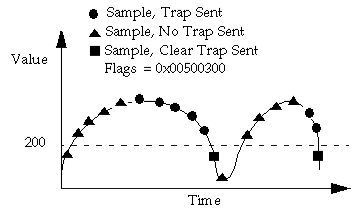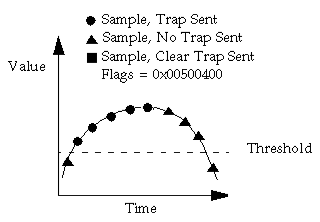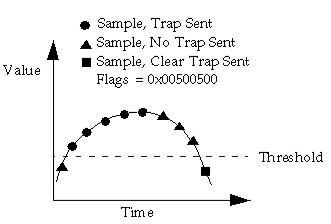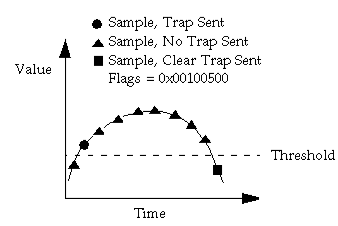

This section provides sample entries for the Self Monitor table to monitor thresholds on the target system. Each example shows how to define the entry and describes the condition being monitored. You can add these entries to sysedge.cf.
Example: Monitor the One Minute Load Average
The following examples configure the agent to monitor the system's one minute load average:
monitor oid 1.3.6.1.4.1.546.1.1.7.8.26.0 11 0x00 60 absolute > 300 'Monitor 1 minute load average' '' ‘kernelperf’ ‘null’ ‘loadAverage1Min’ warning
Corresponds to the OID for the loadAverage1Minute variable contained within the Systems Management Empire MIB
Indicates that this entry will occupy row 11 (monIndex=11) in the Monitor table.
Specifies that the load average should be sampled once every 60 seconds.
Indicates that the agent should use the object's value, not the difference between successive samples.
Indicates the value against which the current load average is compared. If the currently sampled value is greater than (>) 300, an event occurs.
Note: The agent returns load averages as the underlying system's load average multiplied by 100. For example, a load average of 3 is returned as 300.
Indicates that this entry uses kernelperf object class for the object state model. The object class is replaced with default value. Here, '*' is an invalid value.
Indicates that this entry uses null object instance for the object state model. The object instance is replaced with default value. Here, '*' is an invalid value.
Note: '//' and '/' can be used as delimiters to relate an instance to a system: '//hostname/instance'. For local system instances '//./' is always prepended to relate the instance to the local system. '//hostname/*', '//*/instance' and '//*/*' are invalid values.
Indicates that this entry uses loadAverage1Min object attribute for the object state model. The object class is replaced with default value. Here, '*' is an invalid value.
Indicates that this entry uses warning severity for the object state model.
Example: Monitor the Five Minute Load Average
The following example configures the agent to monitor the system's five minute load average:
monitor oid loadAverage5Min.0 12 0x00500300 300 absolute > 200 'Monitor 5 minute load average' '' ‘kernelperf’ ‘null’ ‘loadAverage5min’ fatal
Corresponds to the OID for the loadAverage5Minute variable contained within the Systems Management Empire MIBis entry will occupy row 12 (monIndex=12) in the Monitor table.
Specifies that X=5. Therefore, the agent begins to send traps at the fifth occurrence of the event.
Specifies that the load average should be sampled once every 300 seconds.
Indicates that the agent should use the object's value, not the difference between successive samples.
Indicates the value against which the current load average is compared. If the currently sampled value is greater than (>) 200, the agent sends a trap to all configured managers.
Indicates that no action is specified.
Indicates that this entry uses kernelperf object class for the object state model. The object class is replaced with default value. Here, '*' is an invalid value.
Indicates that this entry uses null object instance for the object state model. The object instance is replaced with default value. Here, '*' is an invalid value.
Note: '//' and '/' can be used as delimiters to relate an instance to a system: '//hostname/instance'. For local system instances '//./' is always prepended to relate the instance to the local system. '//hostname/*', '//*/instance' and '//*/*' are invalid values.
Indicates that this entry uses loadAverage5Min object attribute for the object state model. The object class is replaced with default value. Here, '*' is an invalid value.
Indicates that this entry uses fatal severity for the object state model.
The following illustration shows how the agent would send and clear traps based on this monitor directive:

Example: Monitor the Fifteen Minute Load Average
The following example configures the agent to monitor the system's fifteen minute load average:
monitor oid loadAverage15Min.0 13 0x0 900 absolute > 200 'Monitor 15 minute load average' '' ‘’ ‘kernelperf’ ‘null’ ‘loadAverage15Min’ critical
Corresponds to the OID for the loadAverage15Min variable contained within the Systems Management Empire MIB entry will occupy row 13 (monIndex=13) in the Monitor table.
Specifies that the load average should be sampled once every 900 seconds.
Indicates that the agent should use the object's value, not the difference between successive samples.
Indicates the value against which the current load average is compared. If the currently sampled value is greater than (>) 200, the agent sends a trap to all configured managers.
Indicates that this entry uses kernelperf object class for the object state model. The object class is replaced with default value. Here, '*' is an invalid value.
Indicates that this entry uses null object instance for the object state model. The object instance is replaced with default value. Here, '*' is an invalid value.
Note: '//' and '/' can be used as delimiters to relate an instance to a system: '//hostname/instance'. For local system instances '//./' is always prepended to relate the instance to the local system. '//hostname/*', '//*/instance' and '//*/*' are invalid values.
Indicates that this entry uses loadAverage15Min object attribute for the object state model. The object class is replaced with default value. Here, '*' is an invalid value.
Indicates that this entry uses critical severity for the object state model.
Example: Monitor the System's Interrupt Rate
The following example configures the agent to monitor the rate at which hardware interrupts are occurring on the local system:
monitor oid numInterrupts.0 1003 0x00500400 60 delta > 1000 'Monitor Interrupt Rate' '' 'kernelperf' 'null' 'numInterrupts' warning
Corresponds to the OID for the numInterrupts counter object contained within the Systems Management Empire MIB entry is index 14 in the Monitor table.
Does not specify that the agent should send monitorClear traps; consequently, a monitorClear trap is not sent when the expression transitions from True to False.
Indicates that the interrupt rate should be sampled every 60 seconds.
Tells the agent to measure the rate at which the number of interrupts has changed. Because this object is a counter, delta is an appropriate sample type.
Indicates the value against which the current number of interrupts is compared.
Indicates that this entry uses kernelperf object class for the object state model. The object class is replaced with default value. Here, '*' is an invalid value.
Indicates that this entry uses null object instance for the object state model. The object instance is replaced with default value. Here, '*' is an invalid value.
Note: '//' and '/' can be used as delimiters to relate an instance to a system: '//hostname/instance'. For local system instances '//./' is always prepended to relate the instance to the local system. '//hostname/*', '//*/instance' and '//*/*' are invalid values.
Indicates that this entry uses numInterrupts object attribute for the object state model. The object class is replaced with default value. Here, '*' is an invalid value.
Indicates that this entry uses warning severity for the object state model.
The following illustration shows how the agent would send and clear traps based on this monitor directive.

Example: Monitor the System's Page Fault Rate
The following example configures the agent to monitor the rate at which hardware page interrupts are occurring on the local system:
monitor oid numPageFaults.0 15 0x00500500 60 delta > 1000 'Monitor Page-fault Rate' '' ‘kernelperf’ ‘null’ ‘numPageFaults’ major
Corresponds to the OID for the numPageFaults counter object contained within the Systems Management Empire MIB entry is index 15 in the Monitor table.
Indicates that the interrupt rate should be sampled every 60 seconds.
Tells the agent to measure the rate at which the number of interrupts has changed. Because this object is a counter, delta is an appropriate value for this entry's sample type.
Indicates the value against which the current number of interrupts is compared.
Indicates that this entry uses kernelperf object class for the object state model. The object class is replaced with default value. Here, '*' is an invalid value.
Indicates that this entry uses null object instance for the object state model. The object instance is replaced with default value. Here, '*' is an invalid value.
Note: '//' and '/' can be used as delimiters to relate an instance to a system: '//hostname/instance'. For local system instances '//./' is always prepended to relate the instance to the local system. '//hostname/*', '//*/instance' and '//*/*' are invalid values.
Indicates that this entry uses numPageFaults object attribute for the object state model. The object class is replaced with default value. Here, '*' is an invalid value.
Indicates that this entry uses major severity for the object state model.
The following illustration shows how the agent would send and clear traps based on this monitor directive:

Example: Monitor Number of Incoming Packets on the Interface
The following example configures the agent to monitor the rate at which packets are received by the first ethernet interface (which is le0 for Sun systems):
monitor oid ifInUcastPkts.2 1004 0x0 60 delta > 1000 'Monitor le0 Incoming Packets' '' 'ifEntry' 'WAN MiniPort' 'ifInUcastPkts' minor
Indicates the particular MIB object-instance to sample.
Indicates that the entry is index 16 in the Monitor Table.
Indicates that the agent should calculate the rate every 60 seconds.
Tells the agent to measure the rate at which the number of incoming packets (ifInUcastPkts) is changing.
Specifies the value to use in the comparison. If the change in rate is greater than (>) 1000, the agent sends a trap.
Indicates that this entry uses ifEntry object class for the object state model. The object class is replaced with default value. Here, '*' is an invalid value.
Indicates that this entry uses WAN MiniPort object instance for the object state model. The object instance is replaced with default value. Here, '*' is an invalid value.
Note: '//' and '/' can be used as delimiters to relate an instance to a system: '//hostname/instance'. For local system instances '//./' is always prepended to relate the instance to the local system. '//hostname/*', '//*/instance' and '//*/*' are invalid values.
Indicates that this entry uses ifInUcastPkts object attribute for the object state model. The object class is replaced with default value. Here, '*' is an invalid value.
Indicates that this entry uses minor severity for the object state model.
Example: Monitor Number of Outgoing Packets on the Interface
The following example configures the agent to monitor the rate at which packets are transmitted by the first ethernet interface (which is le0 for Sun systems):
monitor oid ifOutUcastPkts.2 1005 0x0 60 delta > 1000 'Monitor le0 Outgoing Packets' '' 'ifEntry' 'WAN MiniPort' 'ifOutUcastPkts ' ok
Indicates the particular MIB object-instance to sample.
Indicates that the agent should calculate the rate every 60 seconds.
Indicates the sample type because the object being monitored is a MIB-II ifEntry counter.
Specifies the value to use in the comparison. If the change in rate is greater than (>) 1000, the agent sends a trap message to all configured managers.
Indicates that this entry uses ifEntry object class for the object state model. The object class is replaced with default value. Here, '*' is an invalid value.
Indicates that this entry uses WAN MiniPort object instance for the object state model. The object instance is replaced with default value. Here, '*' is an invalid value.
Note: '//' and '/' can be used as delimiters to relate an instance to a system: '//hostname/instance'. For local system instances '//./' is always prepended to relate the instance to the local system. '//hostname/*', '//*/instance' and '//*/*' are invalid values.
Indicates that this entry uses ifOutUcastPkts object attribute for the object state model. The object class is replaced with default value. Here, '*' is an invalid value.
Indicates that this entry uses ok severity for the object state model.
Example: Monitor Number of SNMP Packets Received
The following example configures the agent to monitor the rate at which the agent receives SNMP requests:
monitor oid snmpInPkts.0 18 0x0 30 delta > 4000 'Monitor SNMP Packets' '' ‘snmp’ ‘null’ ‘snmpInPkts’ minor
Indicates the MIB II object instance to sample.
Specifies that the entry is index 18 in the Monitor table.
Indicates that the agent should calculate the rate every 30 seconds.
Indicates the sample type because the object is a counter.
Specifies the value to use in the comparison. If the change in rate is greater than (>) 4000, the agent sends a trap message to all configured managers.
Indicates that this entry uses snmp object class for the object state model. The object class is replaced with default value. Here, '*' is an invalid value.
Indicates that this entry uses null object instance for the object state model. The object instance is replaced with default value. Here, '*' is an invalid value.
Note: '//' and '/' can be used as delimiters to relate an instance to a system: '//hostname/instance'. For local system instances '//./' is always prepended to relate the instance to the local system. '//hostname/*', '//*/instance' and '//*/*' are invalid values.
Indicates that this entry uses snmpInPkts object attribute for the object state model. The object class is replaced with default value. Here, '*' is an invalid value.
Indicates that this entry uses minor severity for the object state model.
Example: Monitor Space on the Root File System
The following example configures the agent to monitor the root (/) file system and to send a trap message when it becomes more than 95% full:
monitor filesystem / devCapacity 19 0x0 120 absolute > 95 'Monitor / Filesystem' '' 'devTableEntry' '/' 'devCapacity' minor
Indicates the particular MIB object-instance to monitor; in this case, the object instance is devTableEntry.devCapacity from the Systems Management Empire MIB devTable. The object instance is not specified because it is determined automatically based on the name of the file system.
Indicates that this entry is row 19 in the Monitor table.
Indicates that the agent should sample every 120 seconds.
Indicates the appropriate sample type because the agent is sampling an integer (not counter) value that represents how full the file system is.
Specifies the value to use in the comparison. If the file system becomes greater than (>) 95% full, the agent sends a trap message to all configured managers.
Indicates that this entry uses devTableEntry object class for the object state model. The object class is replaced with default value. Here, '*' is an invalid value.
Indicates that this entry uses '/' object instance for the object state model. The object instance is replaced with default value. Here, '*' is an invalid value.
Note: '//' and '/' can be used as delimiters to relate an instance to a system: '//hostname/instance'. For local system instances '//./' is always prepended to relate the instance to the local system. '//hostname/*', '//*/instance' and '//*/*' are invalid values.
Indicates that this entry uses devCapacity object attribute for the object state model. The object class is replaced with default value. Here, '*' is an invalid value.
Indicates that this entry uses minor severity for the object state model.
Example: Monitor Space on the /usr File System
The following example configures the agent to monitor the /usr file system and to send a trap message when it becomes more than 95% full:
monitor filesystem /usr devCapacity 20 0x00100500 120 absolute > 95 'Monitor /usr Filesystem' '' ‘devTableEntry’ ‘/usr’ ‘devCapacity’ fatal
Indicates the particular MIB object-instance to monitor; in this case, the object instance is devTableEntry.devCapacity from the Systems Management Empire MIB devTable. The object instance is not specified because it is determined automatically based on the name of the file system.
Indicates that this entry is row 20 of the Monitor table.
Indicates that the agent should sample every 120 seconds.
Indicates the appropriate sample type because the agent is sampling an integer value that represents how full the file system is.
Specifies the value to use in the comparison. If the file system becomes greater than (>) 95% full, the agent sends a trap message to all configured managers.
Indicates that this entry uses devTableEntry object class for the object state model. The object class is replaced with default value. Here, '*' is an invalid value.
Indicates that this entry uses /usr object instance for the object state model. The object instance is replaced with default value. Here, '*' is an invalid value.
Note: '//' and '/' can be used as delimiters to relate an instance to a system: '//hostname/instance'. For local system instances '//./' is always prepended to relate the instance to the local system. '//hostname/*', '//*/instance' and '//*/*' are invalid values.
Indicates that this entry uses devCapacity object attribute for the object state model. The object class is replaced with default value. Here, '*' is an invalid value.
Indicates that this entry uses fatal severity for the object state model.
The following illustration shows how the agent would send and clear traps based on this monitor directive:

Example: Monitor the Number of Processes
The following example configures the agent to monitor the number of processes currently executing on the system and to send a trap when that number is greater than 120:
monitor oid hrSystemProcesses.0 21 0x0 60 absolute >= 120 'Monitor Number of Processes' '' 'hrSystem' 'null' 'hrSystemProcesses' warning
Indicates the variable to be monitored.
Indicates that this entry will be index 21 in the Monitor table.
Indicates that the agent should sample the number of processes every 60 seconds.
Indicates the sample type because the object is a gauge.
Instructs the agent to send a trap whenever the number of processes is greater than or equal to 120.
Indicates that this entry uses hrSystem object class for the object state model. The object class is replaced with default value. Here, '*' is an invalid value.
Indicates that this entry uses null object instance for the object state model. The object instance is replaced with default value. Here, '*' is an invalid value.
Note: '//' and '/' can be used as delimiters to relate an instance to a system: '//hostname/instance'. For local system instances '//./' is always prepended to relate the instance to the local system. '//hostname/*', '//*/instance' and '//*/*' are invalid values.
Indicates that this entry uses hrSystemProcesses object attribute for the object state model. The object class is replaced with default value. Here, '*' is an invalid value.
Indicates that this entry uses warning severity for the object state model.
|
Copyright © 2013 CA.
All rights reserved.
|
|